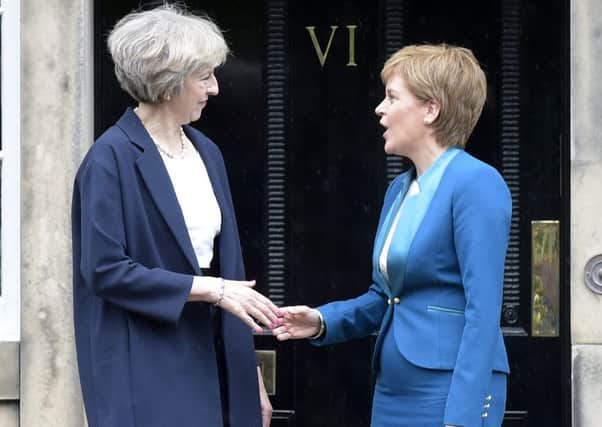Scotland '˜overlooked' in division of powers after Brexit


And the prospect of “intergovernmental conflict” between Westminster and the devolved nations is looming as control over key areas such as farming and fishing are repatriated from Brussels.
About 80 per cent of EU funds coming back to Britain currently go to the administrations in Scotland, Wales and Northern Ireland. But they have so far failed to feature in the question of how the new powers will operate, according to the report entitled Brexit, EU Area-based Policies and the Devolved Governments.
Advertisement
Hide AdAdvertisement
Hide Ad“Since the EU referendum, the post-Brexit future for agricultural, regional and rural policies in the UK has been hotly debated, but the role of the devolved governments in relation to these policies has been largely overlooked,” it warns.
“Even if the UK government decides to continue with area-based policies, important decisions must be made about the allocation of responsibility for their design, administration and evaluation. Repatriating the policies to the UK will pose many political and economic challenges.”
Conflicts over post-Brexit funding decisions have the potential to “disrupt the relationship” between different levels of government within the UK and should not be underestimated, according to the report by Stirling University economist Professor David Bell.
Growing tensions between the devolved administrations and Westminster have emerged in recent weeks, with the growing likelihood that a second Scottish independence referendum will be staged as the SNP seeks to safeguard Scotland’s place in the EU.
Political leaders in Edinburgh, Cardiff and Stormont have demanded greater clarity from Prime Minister Theresa May about her plan for the UK outside the EU.
Scottish Secretary David Mundell held talks recently with Holyrood finance secretary Derek Mackay and Brexit minister Michael Russell about the repatriation of powers after Brexit.
The UK government says it has an open mind at the moment about how the process will work.
Scotland spends about £700 million a year of European cash on farming subsidies and structural funds and Prof Bell says the devolved parliaments will have a pivotal role to play in dealing with a tranche of new controls in agriculture, regional and rural policy which will be returned after Brexit. Some believed that these would naturally fall within Holyrood’s auspices because they are not explicitly reserved in the Scotland Act.
Advertisement
Hide AdAdvertisement
Hide AdThere are widespread concerns among farmers about the prospect of highly lucrative European subsidies, through the common agricultural policy (CAP), being jeopardised or reduced if they are not matched by the UK ministers after Brexit.
Prof Bell says UK ministers may not continue with this “area-based” approach prompting a power tussle with he devolved administrations.
“Some argue that existing EU regional and rural policies do not provide value for money anyway and have consistently failed to achieve their objectives,” the report adds.
“If the UK government accepts such arguments and redirects funding to other priorities conflict with the devolved governments is inevitable.”
Even if these are retained there will have to be “important decisions” about their structure and administration. A Scottish Government spokesman said last night: “The issue of EU funding and what potentially replaces it is a hugely important one for communities across Scotland – and we are clear that any repatriation of powers as a result of Brexit must see responsibilities coming to Scotland and not Westminster.”
Prof Bell outlines possible approaches to the funding distribution. Government officials could consider adopting the Barnett Formula which determines Holyrood’s current grant from Westminster.
Alternatively a new set of “objective statistical measures” could be agreed or the transfer of tax revenues based on an agreed a level of shared support in the devolved nations.
He said: “Using the Barnett Formula would be a fairly straightforward option, however, if agriculture and regional spending is cut back in England by the UK government, the devolved governments would come under pressure to follow suit.”